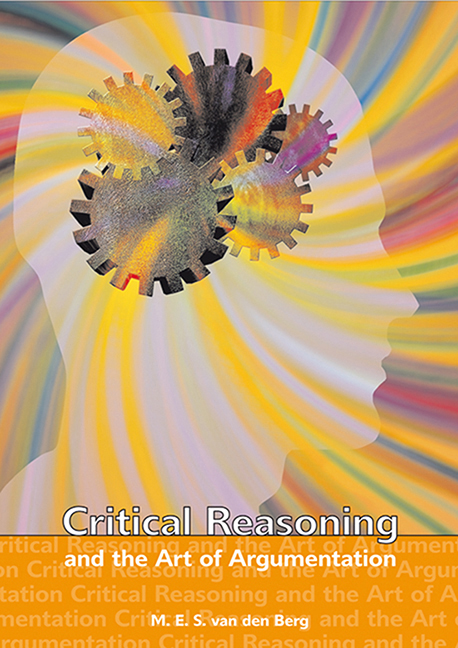Book contents
- Frontmatter
- Contents
- Preface
- CHAPTER 1 What is critical reasoning?
- CHAPTER 2 Obstacles to clear thinking: Preconceived ideas and fallacies
- CHAPTER 3 Working with arguments
- CHAPTER 4 How to analyse arguments
- CHAPTER 5 Definitions, counterexamples and counterarguments
- CHAPTER 6 Evaluating arguments
- CHAPTER 7 Applying your knowledge and skills to the evaluation of arguments
- CHAPTER 8 Constructing arguments and writing argumentative essays
- References
- Glossary
- Index
CHAPTER 8 - Constructing arguments and writing argumentative essays
Published online by Cambridge University Press: 20 February 2020
- Frontmatter
- Contents
- Preface
- CHAPTER 1 What is critical reasoning?
- CHAPTER 2 Obstacles to clear thinking: Preconceived ideas and fallacies
- CHAPTER 3 Working with arguments
- CHAPTER 4 How to analyse arguments
- CHAPTER 5 Definitions, counterexamples and counterarguments
- CHAPTER 6 Evaluating arguments
- CHAPTER 7 Applying your knowledge and skills to the evaluation of arguments
- CHAPTER 8 Constructing arguments and writing argumentative essays
- References
- Glossary
- Index
Summary
There are no dull subjects. There are only dull writers.
H L MenckenThis chapter focuses on constructing arguments and writing argumentative essays. In the preceding chapters we concentrated on the task of how to think critically and how to read, analyse and evaluate the arguments of others. This is only one aspect of critical reasoning. As a critical thinker, you must also know how to express your thoughts in writing and this involves knowing how to construct arguments. When you write philosophical essays you must apply the criteria for acceptable arguments to your own arguments.
Writing is difficult and it takes a lot of practice to express one's thoughts and ideas in writing. However, you can learn skills that will help you to be a better writer. You can learn the necessary skills to construct an essay that is coherent, clear and convincing. In this chapter we will look at the process of writing and provide guidelines for writing a good critical essay.
You will find the hints and guidelines for writing a good critical essay, which we discuss here, helpful in some of your other university courses, such as psychology, anthropology, English studies, sociology, political science, teacher education, jurisprudence, and so on. Often, in assignments and examinations, you will come across the instruction to ‘discuss critically’, ‘analyse’ and/or ‘critically evaluate’ an issue, a problem or a statement. Remember that what you have learnt in critical reasoning is not disconnected or divorced from other fields of study; this book will have failed if you do not apply the knowledge and critical skills you have acquired here to your other subjects, and to everyday life (your domestic life, your work situation and your communication and interaction with other people).
Different kinds of writing
In chapter 3, I pointed out that critical reasoning is concerned with arguments and argumentation. Therefore, critical reasoning is concerned with argumentative writing. You should be aware that argumentative writing is not the only kind of writing. In fact, there are many different forms of writing. Here will we focus on four kinds of writing: descriptive writing, comparative and contrast writing, narrative writing, and argumentative writing. Although critical reasoning's primary focus is argumentative writing, we should also know about other forms of writing, because this will give us a better idea of what argumentative writing is all about.
- Type
- Chapter
- Information
- Critical Reasoning and the Art of Argumentation , pp. 128 - 139Publisher: University of South AfricaPrint publication year: 2010



